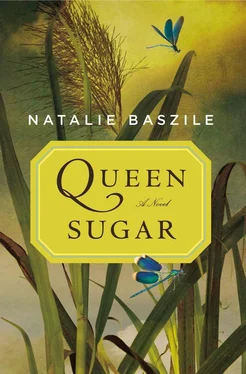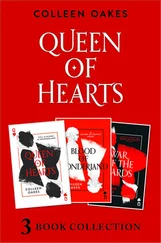But something felt wrong, which was why he was procrastinating; why it had been three days since they left Phoenix and he’d driven only as far as Flagstaff. If he turned around now, they would be back in Phoenix by midnight, no later than two. He could put Blue to bed, get Mrs. Abernathy across the hall to babysit while he returned the car. Only there was no home to go home to. Six months ago, the sheriff nailed an eviction notice on the door, set their clothes on the street. For the last four months, they had lived at the Wagon Wheel, a motel at the end of East Van Buren, where he paid for their room by the week. There was no job to wake up for, because he got fired.
“I’m hungry,” Blue said. “What do we have to eat?”
Ralph Angel looked at the empty passenger seat. If Gwenna were here, she’d have thought ahead, packed sandwiches, drinks, and something sweet as a surprise. That was one of the things he loved about her; she always thought ahead, always scanned the horizon for problems, like a ship’s captain stationed at the bow. “We’ll stop soon,” Ralph Angel said. “Just hold on.” He glanced at the passenger seat again and braced himself against the twist of longing. There was no Gwenna to pack sandwiches or encourage him to look for another job; no Gwenna to reassure him everything would be okay because Gwenna was dead.
“Are we there yet?”
“Those four words,” Ralph Angel said, “I don’t want to hear them. Now sit back.” He let his eye wander across the landscape, the sloping golden foothills dotted with ponderosa, and tried again to picture them in Montana. He’d rent a small house with a yard that opened onto a meadow. Blue and his friends would build a fort in the woods or by a lake if there was one close by, and when the boys got older, they’d stay out all weekend, camping and fishing the way boys liked to. He’d go to all of Blue’s games — baseball and basketball — and sit in the bleachers with the other parents. “That’s my kid,” he’d say when Blue scored the winning basket. “That’s my kid.”
Ralph Angel glanced at the sudden movement in the rearview mirror. Zach wagged back and forth while Blue chanted, “Are-we-there-yet-Are-we-there-yet,” like a drumbeat. He tried to ignore it, tried to focus on the road and their life in Billings, until finally he reached back, grabbed Zach, and held him out the window. He felt the sun warm his hand, smelled the clean scent of pine. “You done?” Except for the wind, the car was silent. After five long seconds he said, “Thought so,” and passed the action figure back.
• • •
At Tuba City, Ralph Angel took a break. He pulled off the road and into the rest stop parking lot, wedging the Impala between two semis.
“Pop?”
Tourists on their way to or from the Grand Canyon filed through the double doors, headed toward the restaurant. Ralph Angel imagined them bent over burgers and fries.
“Stay in the car. I’ll be back.”
“But I’m hungry and Zach has to pee,” Blue said.
“Tell him to hold it. Let me see what they’ve got in there. I’ll be back in a second.” Ralph Angel tucked in his shirt and zipped his jacket halfway. He scanned for Highway Patrol, then fell in line with people entering the building.
Inside, the air was heavy and smelled like doughnuts. There was a restaurant, a minimart, and beyond, a row of fast-food counters. His stomach seized at the thought of day-old grease, of plates smeared with ketchup, cigarette butts tucked into wadded napkins. The summer before he went off to college, he’d worked briefly as a dishwasher at the Waffle House just outside town, and had been surprised and horrified by what people did with their food. “People are animals,” Eddie the busboy said, stacking dishes on the stainless steel sink, and Ralph Angel had agreed. Now he closed his eyes as the nausea swelled, then passed. When it was gone, he watched the swirl of people moving through the lobby: women in capri pants and visors, men in cargo shorts and fanny packs, kids Blue’s age, running giddily across the tiled floor.
Surprisingly, the minimart was empty, peaceful as a library. As Ralph Angel entered, the young woman behind the counter looked up from her magazine. She wore bright pink lipstick and her mouth reminded Ralph Angel of the wax lips he chewed as a kid. He flashed a smile.
“Water?” he asked.
She pointed to a bank of refrigerators on the far wall, then went back to her reading.
Ralph Angel gave a cheerful thumbs-up, then made his way down the aisle, being sure to walk deliberately. He wanted the girl to see he had a goal, he was a man who wanted water. When he reached the back wall, he slid the glass doors open and felt the rush of cold air, like a light slap in the face, looked for the cheapest bottled water and took two. Glancing toward the front of the store, he saw that the girl’s head was down, still reading. She tucked a strand of hair behind her ear in the slow, unconscious way women did when they were preoccupied.
Beside him, the refrigerators hummed steadily, and Steely Dan’s breezy hit “Rikki Don’t Lose That Number” wafted in from the food court, over the echoes of families chattering, and coins jingling, and cashiers calling out people’s orders. They were the sounds of summer. For a few seconds, as Ralph Angel stood listening, it seemed to him that the day was filled with possibility, as if a yolky, glowing ball hovering over the rest stop was suddenly cracked open, spilling warmth and light down on all those inside. For a moment he felt it, like a faint pulsing: the lightness that came with a few lazy summer months, the quiet joy in being connected to people you loved and who loved you. But then it faded, and he was flooded with the awesome knowledge that he was all alone — no mother, no father, no Gwenna. Just him and Blue.
And so, as he walked up the aisle toward the register, Ralph Angel plucked items off the shelf: Tiger’s Milk bars, Snickers, Slim Jims — whatever he touched — and dropped them into his sweatpants, because he had to feed his boy, because raising his son was the only thing he was good at, and he would do whatever it took. The wrappers crackled as they slid down his leg and came to rest above the ankle elastic. The urge to take inventory, like a trick-or-treater, surged within him.
At the counter, his heart pounding, Ralph Angel managed to hold up the bottles of water. “You got a bathroom in here?” he asked, tossing two crumpled dollars on the counter.
The girl’s mangy blond hair was swept up in a giant butterfly clip. She was like the young, fast white girls in Phoenix who hung out at the park; girls who laughed in his face, cussed him out just for fun.
“Down the hall next to Roasters.” She scanned the bottles, dropped them into a plastic bag, and held it out to him.
“Cool. Thanks.”
As Ralph Angel turned to leave, the corner of the Tiger Milk bar slipped out of his pants leg, dragged on the floor with a sushing sound.
“What’s that?” the girl asked, pointing. She leaned across the counter.
Ralph Angel glanced down at the triangle of shimmery gold foil. He looked at the girl.
“Dude,” she said, her face darkening, “are you fucking boosting?” She looked right at him, not through him or past him the way so many people did, but right into his eyes, her gaze direct, searing.
Ralph Angel opened his mouth, but before any words could come, the girl stepped backward, felt for the phone mounted on the wall.
“It was an accident,” Ralph Angel managed. “I don’t know what I was thinking.” He approached the counter, his hands out where she could see them, then reached in his pocket and pulled out a small roll of bills. “Jesus, just give me a minute.” His hand trembled as he unfolded a twenty and a wad of singles. “This is all I’ve got. I swear.”
Читать дальше












